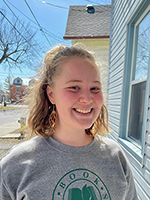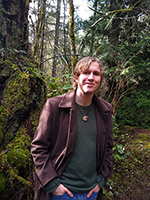 Screener Molly Pearce talks with the spring issue #226 contributor about the myth of art vs. science, writing as a way to both think and communicate, and seeking community in the arts.
Screener Molly Pearce talks with the spring issue #226 contributor about the myth of art vs. science, writing as a way to both think and communicate, and seeking community in the arts.
MP: These poems seem to encourage readers to invite the wild closer into our domesticated lives, which are too often very separate from nature. What do you think a closer relationship with our environment brings to our lives? I wonder if you might speak more to your motivation for sharing these ideas with your readers.
TR:
I don’t think I have a very satisfying answer to this question, because relationships with environments—particularly the other biotic parts of environments—are fairly all-consuming for me, so it emerges in my writing less from identifiable motivations and more from how I interact with the world. My main goal in life is to be in water or in soil as often as possible, and when I’m not, I’m usually writing and thinking about it. Over the past couple of years quite a lot of my writing has been about aquatic animals I’ve met working on lakes near Kenora, so jumping to worms in my apartment was an easy progression.
That being said, I will take the opportunity to say that urban landscapes and homes are not thought about in terms of biodiversity as often as they could be, and I think it’s important to spend time with the soil and creatures in and around our homes wherever they are. Environmental writing, too, has often turned to ideas of “nature” that are actively colonial, including by ignoring ongoing, intergenerational relationships between people and their environments. As a settler writer, I have a responsibility to keep this tradition in mind and to actively work against it, which will be a lifelong task of learning. So I think that in general, relationships with the environment are a non-negotiable part of my writing and my life, but from that starting point these relationships are in constant renegotiation.
Read the rest of Tazi Rodrigues' interview & one of her poems.
Dylan Clark, issue #226 fiction contributor
 Screener Jane Frew talks with the spring issue #226 contributor about the toxic ideals of patriarchal masculinity, relationships between behaviour and place, and how writing is an agent of cultural change.
Screener Jane Frew talks with the spring issue #226 contributor about the toxic ideals of patriarchal masculinity, relationships between behaviour and place, and how writing is an agent of cultural change.
JF: You chose a title for your story that seems thematically at odds with the story itself, begging the question of what it means to be “safe” in a violent world. Can you speak more to why you chose this title?
DC:
The title is a small play on words, which was meant to be suggestive of some of the story’s themes. On the one hand, safety is a state of being in which we are free from violence and harm. On the other, a safety is the switch on a gun that prevents it from being fired.
The story touches on various kinds and degrees of violence, including gun violence and socialization. In our own reality, there is a high correlation between men and acts of violence. So in one sense, I wanted to allude to the theme of masculine violence, and maybe also the hope to liberate masculinity from violence and anti-social behaviour.
Conversely, there is a safety in conforming to the norms of patriarchal masculinity. By choosing to conform, Jamie would be rewarded with social acceptance and the resulting privileges of patriarchy. Personal safety could, in a self-contradictory and negative way, mean the embrace of violence and social competition. Similar to a gun’s safety, the type of safety bestowed by privilege is unstable.
Read the rest of Dylan Clark's interview & an excerpt from his story.